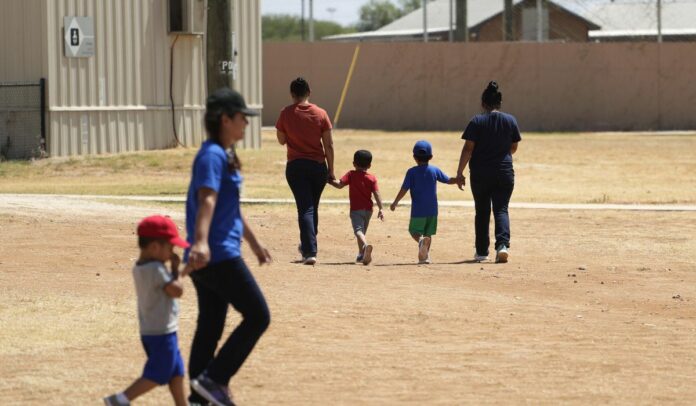The Trump administration says that it’s running family detention facilities at just 7% capacity during the coronavirus pandemic as it tries to prevent an outbreak.
No illegal immigrant has contracted the coronavirus in the federal government’s three family detention centers, but five new arrivals have tested positive for COVID-19, according to U.S. Immigration and Customs Enforcement.
That included three adults and two juveniles. Only one of them showed symptoms, ICE reported in filings to a federal court late Monday.
The data comes as the administration battles in the courts with immigrant-rights activists, who have demanded a large-scale release of families, citing the pandemic.
ICE says it’s released some illegal immigrant families and is detaining others at a slower pace, which has helped keep the population down at the three family detention centers. The Berks facility in Pennsylvania is working at 20% capacity; the Karnes facility in Texas is at 9% capacity; and the South Texas Family Residential Center, by far the largest with 2,400 beds, has just 142 people, or just 6% of capacity.
But the agency has rebuffed calls to empty the facilities altogether.
U.S. District Judge Dolly M. Gee, an Obama appointee in the Central District of California, has been pushing ICE for releases, and ordered the agency to try to work out a process with the families and their lawyers.
But ICE appealed her ruling this week.
The agency says Judge Gee’s framework creates a tricky situation. If parents don’t agree to release their children to foster families, then ICE says it would either have to release the family as a whole — creating a perverse incentive for parents to bring children as a way to get out of detention — or else release the children without parents, and risk being accused of family separations.
The administration is still reeling from the fallout of family separations in 2018, during the zero-tolerance border policy.
Under a previous order by Judge Gee, ICE can generally hold children who came across the border with parents for up to about 20 days before they must be released, either into the community or to the federal Health and Human Services Department.
Juveniles who arrived without parents — so-called Unaccompanied Alien Children (UAC) — must be quickly transferred within three days to HHS, which runs shelters that house the children while foster families are sought.
According to court filings this week, those HHS facilities have cut their population from more than 3,500 in mid-March to fewer than 1,000 as of the middle of August, and are running at just 6% of capacity.
The shelters serve as schools, clinics and entertainment for the children they house.
As of Aug. 22, nine children in the shelter system tested positive for COVID-19. Most of those came into the system with the disease, HHS’ juvenile coordinator reported to Judge Gee.
Even in coronavirus quarantine, those children still get the same level of services.
The coordinator described the situation at one shelter: “The room is equipped with a twin-size bed with colorful linens, a private in-room bathroom and child friendly artwork and decor. Each minor is able to draw with chalk, hang drawings and personalize their bedroom. Also, each child is provided a deck of playing cards, a journal to write in, a sketchpad and a stress ball. Additionally, at their request, minors are provided with yarn for arts and crafts, materials to make key chains, puzzles, and coloring books with colored pencils.
“Religious material and an approved playlist of music is also offered if they choose. Depending on the interests of the minor, the shelter can also provide literature, dolls or other types of materials for arts and crafts (e.g. aluminum etching, beads for bracelets, threading, etc.). Additionally, the minors are offered approved options to watch movies, shows or videos at scheduled times. The shelter has a subscription to Disney Plus and can access shows in Spanish.”






